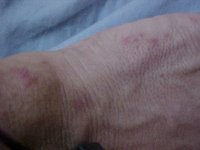Things I would like to get off my chest...
In honour of my last day of my internal medicine rotation, I would like to air some grievances. So here, in brief, are a few things that I've wanted to say at some point during the past two months.
To the nurse who paged me at 3:30 in the morning, 10 minutes after I had managed to drag myself to my call room for the first time that night-- you seriously called me to clarify a TYLENOL order from someone I'd just admitted from emerg? Are they in dire need of Tylenol RIGHT NOW? No? Then leave me alone.
To the woman who gives out the call room keys at the information desk of the hospital-- I am aware that it is 4:45pm. I am also aware that we aren't supposed to pick up call room keys until 5pm. But this might be the only chance I get to get down to the information desk before the keys become fair game to other services at 1am. So unclench and give me a freaking key.
To the patient who told me that the reason she was feeling better was because my attending was such a good doctor and that she really respected and valued his medical skill. My attending couldn't pick you out of a lineup. I am your doctor, for all intents and purposes. I am the one who has visited you daily, managed your care, fought on your behalf for tests and spent time looking up information on alternative treatment options. He visits you for about 10 seconds every second day or so. Not that I'm looking for a medal here, but seriously!
For the rookie nurse that just started on the floor-- I don't envy your position. You must feel overwhelmed. But if you call me in the middle of the night wanting something ordered, please at LEAST know what the person was admitted for, what other meds they're on and what allergies they have. When I have to sit there holding the phone while you say "um, I'm not sure" and look through the patient's chart, I am not amused.
To my senior, who knows a helluva lot of internal medicine and very little about people-- that's really something you need to work on. Yelling at a patient's family member because she doesn't understand the difference between "intubation" and "resuscitation" when clarifying code status will not win you Humanitarian of the Year awards.
To the infection control people, whomever you are-- my patient has been in the hospital for three days with a COPD exacerbation. I have no idea what posessed you to decide that he needed to be in isolation with droplet precautions AFTER we discharged him home (for the 15 minutes he was waiting for a cab) but that may win the prize for the most ridiculous hospital policy ever.
To my attending-- don't manage my patients behind my back. Particularly not if you're going to decide, with the help of the urology attending, what the right treatment is for my patient when you've never taken the time to actually meet her. If you'd spoken to me, you'd know that putting a percutaneous nephrostomy tube in a developmentally delayed woman who yanks out lines as fast as we can place them is a recipe for disaster.
To the entire Interventional Radiology department-- what the hell makes you so special? Why can you get away with not answering phones, not returning calls and not answering pages? Why do we need to actually go down to IVR and seek you out in person and beg you to perform procedures on our patients, like you're doing us a big, fat, favour? IT'S YOUR FREAKING JOB!
To the nurse on 4Z who paged me 4 times in an hour because I hadn't come to pronounce her patient yet-- as I've told you three times already, I am dealing with someone crashing on the floor. Your patient is unlikely to get any deader. The one I am treating right now is a very different story. So no, pronouncing your patient is not my priority right now.
To the chief medical resident who made up the call schedule for the month of June-- was scheduling me for 4 call in 8 days a punishment for taking vacation at the beginning of the month? Or are you just trying to kill me? And I know that someone has to be on call on the last day of the rotation... but why does it always seem to be me?
Sigh. I feel better now.
Labels: internal medicine, nurse



